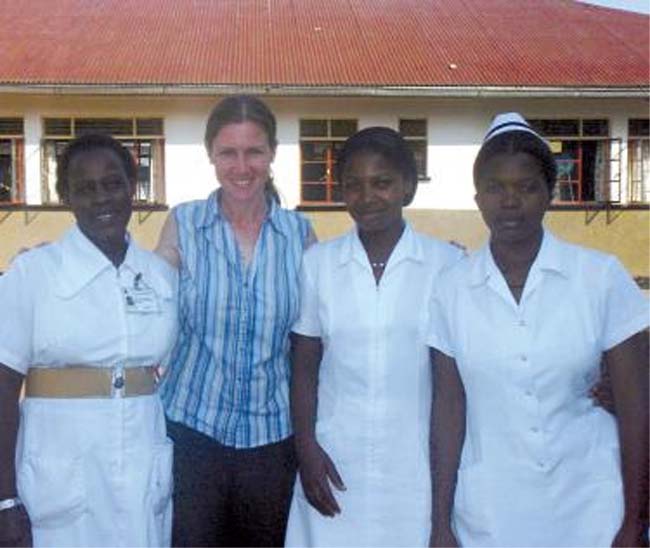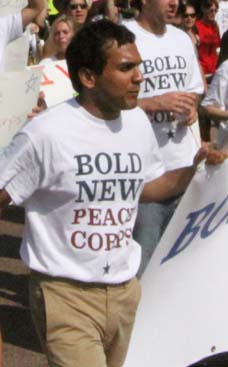
Dr. Chamberlain has been to Uganda twice and plans on returning next summer. There is always a volunteer physician at the hospital. Trained emergency physicians can also find out how to volunteer their time through the website. Dr. Chamberlain is the assistant director of the International Emergency Medicine and Health Fellowship Program at the University of Illinois at Chicago and also works in the ER at St. Mary's of Nazareth Hospital in Chicago. A fellow of hers volunteered in Uganda in October and said the hospital is functioning at a high level with the newly trained ENPs seeing patients independently. Dr. Chamberlain added more people in the area are going to the hospital because of the reputation it has earned. "Everyone noticed tremendous improvements in the emergency care services " Dr. Chamberlain said. Dr Chamberlain has long  had an interest in providing medical assistance in an international arena She volunteered in the Peace Corps in Senegal and went to Zambia while in medical school She made two trips to Haiti after the devastating earthquake creating an ad hoc emergency care department in Port-au-Prince and helping to rebuild the medical system there.
Senegal RPCV Dr. Stacey Chamberlain is one of several founding members of the non-profit Global Emergency Care Collaborative (GECC), which has worked to develop an emergency room and training program for nurses in a Ugandan hospital over the last several years
Charity builds ERs in poorest nations
Charity builds ERs in poorest nations
Global Emergency Care group on a mission to save lives
by Kevin Olsen
staff reporter
Hospitals in developing countries around the world often struggle at providing the necessary medical services that so many Americans take for granted.
Dr. Stacey Chamberlain is one of several founding members of the non-profit Global Emergency Care Collaborative (GECC), which has worked to develop an emergency room and training program for nurses in a Ugandan hospital over the last several years.
GECC was incorporated in 2008 and identifies areas in the developing world without access to life saving emergency care. It partners with existing hospitals and trains existing nurses to provide this care.
GECC's first efforts, which are still ongoing, were with the Nya-kibale Hospital in Uganda. Dr. Chamberlain and other members came in, raised funds to create an emergency room and trained a batch of nurses to become emergency nurse practitioners (ENPs).
"There's a lot [the hospitals] can do, but it's a matter of organizing and finding a specific location in the hospital," Dr. Chamberlain said. "It's a matter of educating on how to provide services and provide physical space."
The first class of nurses, who were already employed at the hospital, graduated last March and are now the ones training a new class of ENPs, Dr. Chamberlain said. Two unused broom closets were transformed into the hospitals first emergency  room The preliminary results have been very encouraging; compared to data at other Uganda hospitals Nyakibale has had a significant reduction in deaths for children five and under, Dr. Chamberlain said.
Before the emergency room was constructed doctors would make rounds only three days a week leaving people who needed immediate care at a much greater risk of further illness or death There is no intensive care unit and ineffective electricity at times but nurses now have the ability to administer IVs and provide antibiotics to find common diseases in Africa such as malaria or sepsis.
"We noticed people who were critically sick weren't getting the service they needed " Dr. Chamberlain said.
GECC has funding to complete the current training class. It has survived with donations from friends family and small grants. Chamberlain said if research proves they are using an effective model it will pursue larger grants as revenue sources.
People can donate on the organization's website global emergencycare org through check or PayPal.
A donation of $250 pays for one month of a nurse's training program which translates to thousands of lives touched, the website states. GECC has minimal overhead so donations go directly to program implementation and development.
GECC is now looking to expand to other sites in Uganda and into other developing countries. The focus is now on training nurses to function independently, doing much of the same work emergency room doctors do in the United States. Dr. Chamberlain said the GECC is working with the Uganda minister of health to help coordinate with them on developing health care in the African nation. The goal of the organization is to have other hospitals raise their own funds for an emergency room while GECC comes in to train ENPs.
Dr. Chamberlain has been to Uganda twice and plans on returning next summer. There is always a volunteer physician at the hospital. Trained emergency physicians can also find out how to volunteer their time through the website.
Dr. Chamberlain is the assistant director of the International Emergency Medicine and Health Fellowship Program at the University of Illinois at Chicago and also works in the ER at St. Mary's of Nazareth Hospital in Chicago. A fellow of hers volunteered in Uganda in October and said the hospital is functioning at a high level with the newly trained ENPs seeing patients independently.
Dr. Chamberlain added more people in the area are going to the hospital because of the reputation it has earned.
"Everyone noticed tremendous improvements in the emergency care services " Dr. Chamberlain said.
Dr Chamberlain has long  had an interest in providing medical assistance in an international arena She volunteered in the Peace Corps in Senegal and went to Zambia while in medical school She made two trips to Haiti after the devastating earthquake creating an ad hoc emergency care department in Port-au-Prince and helping to rebuild the medical system there.















